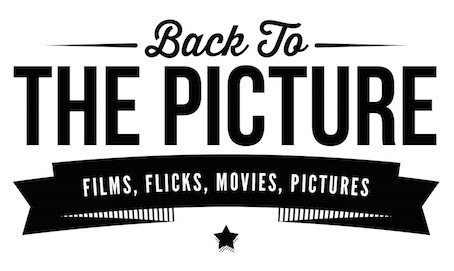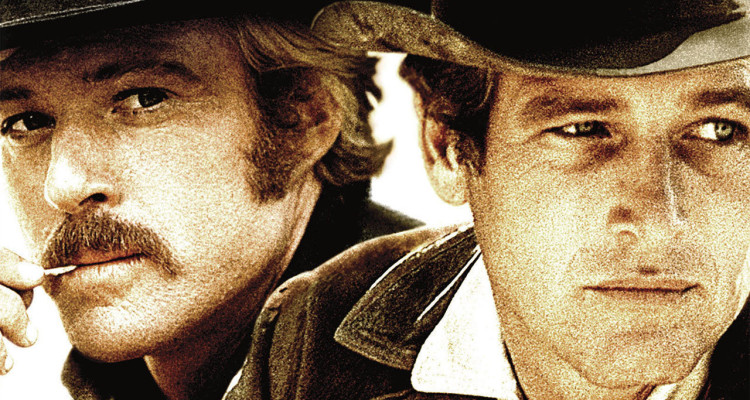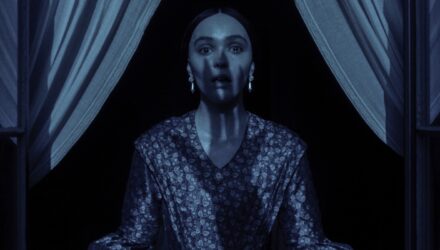Sometimes a movie is so subtle in its storytelling, that you don’t see it right away. The real stakes are not evident from the start, the protagonists’ goals are not clear and the structure & pacing appear off. To make a movie like this work, the dialogue, the actors, the cinematography…everything, must be firing on all cylinders so that you’re still engaged despite not knowing where the movie is headed or why. For my money, Butch Cassidy And The Sundance Kid stands as the paradigm for how that sort of film works.
Before diving into the film, I’d like to first examine the opening scene. Presented in a sepia tone, it stands slightly apart from the story and serves as a preamble. Not only is this a great scene of camera movement and acting, but it beautifully sets the audience up for the film’s themes. Here’s the opener.
Sundance is accused of cheating in a card game. A fellow cardplayer wants to draw on Sundance for cheating, but the scene quickly turns as the cardplayer backs down when Butch reveals Sundance’s identity. By just being themselves, they gain the upper hand. And that’s pretty much their strategy. Be themselves, and things end up working out for them. These guys are a team of great charisma and inimitable skill, able to change any predicament they find themselves in, getting out of any pickle they end up in. The film that follows slowly reveals the one thing they are unable to change that will be their undoing: themselves.
Now, for those who haven’t seen it in a while, here’s the rest of the film that follows.
Butch Cassidy and the Sundance Kid, immortalized by Paul Newman and Robert Redford respectively, with the aid of Butch’s Hole In The Wall gang, hold up the railroad one time too many, and when a man of limitless wealth is willing to spend more money than he’d lose to robbery just to run the duo down, the chase is on. The first half of the film acts as one long chase sequence, with Butch and Sundance avoiding an unrelenting posse, who the audience never gets to see except from Butch and Sundance’s perspective. They are never even explicitly identified. (Who are those guys?) Through a daring leap off a cliff, they are able to finally escape the posse. Upon hearing that the posse was hired exclusively to find them and kill them, they all, now including Etta Place, Sundance’s love interest (played by Katharine Ross), decide to flee to Bolivia. After such a close call with the law, what do they immediately do? Rob the Bolivian banks. Literally, almost immediately. They don’t even know the language yet. The Bolivian law quickly catches on, and when they come a little too close for capture for their taste, the duo finally decide to go straight. Hired as protection for a mine’s payroll, they end up gunning down six Bolivian thieves. It seems that even in going straight, they’re still claiming money that isn’t theirs at the end of gun. Of course, the Bolivian law catches up with them, and even at the bitter end, as they bandage each other’s bloodied bodies, they can’t stop quipping and joking. And as they run headlong into their deaths, it is unclear that they understand how many Bolivian army issued rifles are outside pointed at them. The film ends in an infamous freeze-frame, with Butch Cassidy and the Sundance Kid running full-stride forward into the gunfight, moments before are riddled with unnumbered bullets.
As I said earlier, the classic elements in a film are not immediately clear here. Butch and Sundance don’t seem to be in any real danger until relatively late in the film, and even so, any danger is underplayed by their unending joking and laughing. As protagonists Butch and Sundance don’t seem to want anything specific. Their goals can best be described as “keep doing what they’re doing.” And the extensive posse chase feels like a much longer sequence than the story beat necessitates (particularly by today’s standards) throwing the structure & pace of the film in question. And yet, as I also said above, the snappy, punchy dialogue, the subtle, light-hearted acting, and the vista-capturing, deliberate cinematography all keep us engaged regardless. What’s happening is we’re been tricked into thinking you’re watching a fun, easy-going Western flick. Characters having too much fun to be in any real danger, cinematography meant for spectacle, even bicycle tricks to music by Burt Bacharach, all contribute to the feeling that everything is fine for these two guys. But when Butch and Sundance ask an old gunslinging lawman (single-scene-stealing Jeff Corey) to help them and he flat out refuses, the film makes explicit what we’ve only just come to realize. We are witnessing two men slowly, unknowingly and consistently entrench themselves deeper into a lifestyle that cannot but end in their death.
At its heart, this movie is not light-hearted and fun. But this is not an accidental mish-mash of tone and subject matter. All those pleasant trappings only better serve the tragedy that is unfolding. And Newman and Redford are so strong and consistent in their performances, it sometimes seems that even they don’t know the movie they are making. And Ross’ Etta Place, who might have been easily dismissed as the token female who is just trying to tell these boys to grow up, perfectly executes the push-pull relationship between her desire to avoid the tragedy that will ultimately unfold, and her desire to be with these two men who she cannot help but be drawn to. As the audience, we are her, who can’t help but watch these two men go laughing, guns out, headfirst to their end. And though she eventually breaks free of their spell, we do not, and witness their spiral until the very end.
At least, almost the very end. This film does such a great job of making us like these tragic characters that it would be too much for us to actually see them gunned down. Which I don’t mind in the least. It only helps the film pull the fun and frivolous wool over my eyes the next time, which is probably pretty soon.
9.1
Hold(s) Up
The hold-ups hold up.
Story
9.5
Cinematography
9
Acting
9
Editing
9
Design
9





